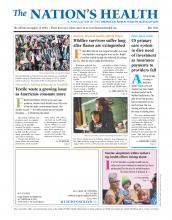
A Republican-led effort to end Medicaid expansion would place the health of millions in jeopardy, a new analysis finds.
Photo by Jelena Stanojkovic, courtesy iStockphoto
A Republican-led plan to cut federal funding for Medicaid expansion would result in 11 million Americans losing health coverage, a recent analysis finds. Expansion states would have to make up the shortfall, which would cost each state billions of dollars annually.
If federal cost-sharing ends, states that expanded Medicaid to cover more people would need to increase spending in 2026 by nearly 26% to maintain current expansion rolls, according to a new Urban Institute report supported by the Robert Wood Johnson Foundation.
Each of the 40 expansion states and the District of Columbia would need to find about $44 billion next year to fund the program, the report said. For Colorado, Indiana, Montana, Nebraska, New York, Oregon and Washington, state spending would rise by one-third. Montana’s expansion spending would jump by about 36%, Indiana by nearly 40% and North Dakota by 47%.
Nearly 16 million people nationwide would be unenrolled from Medicaid, the report said. People ages 19 to 34 and older than 55 who have poor or fair health would be the most likely to be uninsured if expansion disappears.
Iowa, Kentucky, Louisiana, Michigan, New Mexico, New York, Pennsylvania and West Virginia, as well as the District of Columbia, would have the most people become uninsured, according to the Urban Institute analysis, which used a health insurance policy model to estimate possible shortfalls in state budgets and declines in Medicaid rolls.
“People who earn modest wages will go without health insurance, either because they aren’t offered insurance through their jobs or cannot afford the cost of the policies available to them,” said Kathy Hempstead, PhD, senior policy adviser at the Robert Wood Johnson Foundation, in a news release. “Rolling back Medicaid expansion would imperil the health of millions while crippling state budgets and economies.”
Medicaid expansion in crosshairs
Federal and state governments share the cost of Medicaid, which provides health coverage for 72 million low-income people. Medicaid pays for 40% of all U.S. births, 63% of all nursing home residents and health coverage for more than one-third of underrepresented groups.
In 2014 under the Affordable Care Act, states were granted the ability to expand Medicaid coverage to people with incomes up to 138% of the poverty level, about $20,700 per person in 2024. For the 40 states and the District of Columbia that have expanded Medicaid eligibility, the federal government pays an enhanced federal matching rate. For people in the expanded group, up to 90% of health care expenses are paid for by federal funds.
Slashing the Medicaid budget has been a talking point for decades for Republicans, who now control both chambers of Congress as well as the White House.
In February, the House passed a budget resolution asking for $880 billion in savings over 10 years from the House Committee on Energy and Commerce. While the bill never mentions Medicaid, most of the committee’s spending discretion involves the health insurance program.
Congressional Republicans will not be able to reach their goal of cutting $1.5 trillion from the federal budget without cutting benefits provided under Medicaid and Medicare, the Congressional Budget Office said on March 5.
Medicaid expansion has many benefits besides supplying people with health insurance who otherwise could not afford it, the Urban Institute report authors said.
Health coverage offers some financial security for people who otherwise could be saddled with medical bills they cannot pay, the authors said. Also, having the means to address unwanted pregnancies and access to effective contraception through Medicaid enhances family planning and household finances.
Expansion can also improve hospital finances, by reducing the number of people who are uninsured, and improve state economies, the report said. In Montana, Medicaid expansion brought an additional $600 million to the state each year, supporting 7,500 jobs and $400 million in earnings.
For more on the report, “Reducing Federal Support for Medicaid Expansion Would Shift Costs to States and Likely Result in Coverage Losses,” visit www.rwjf.org.
- Copyright The Nation’s Health, American Public Health Association









